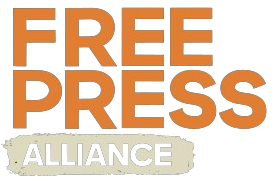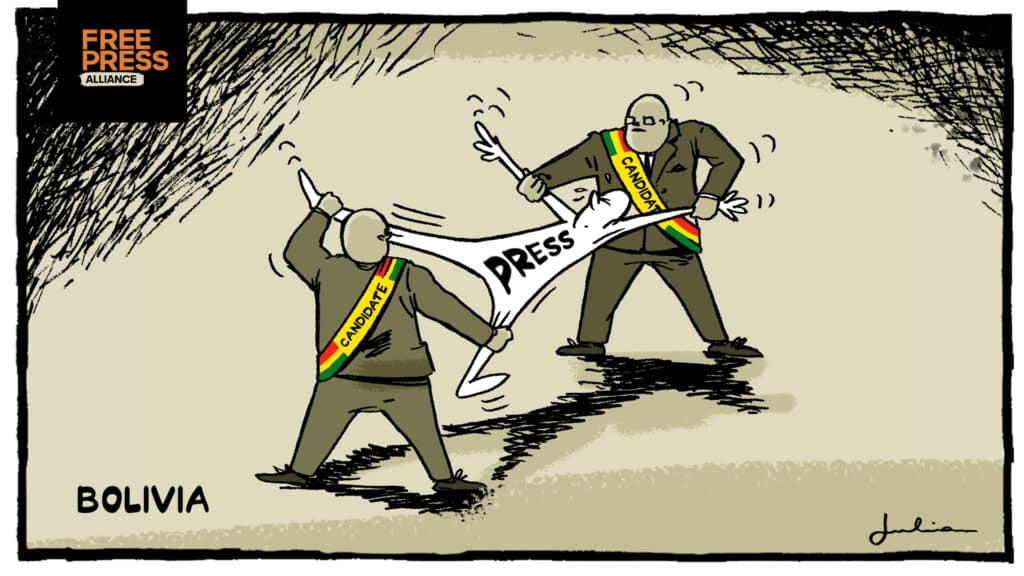After more than two decades of intimidation, legal harassment, and violence, journalists in Bolivia fear that risks will intensify as the country heads toward a presidential election with no clear frontrunner.
On August 17, Bolivians voted for the first time in 20 years without a single candidate from the once-dominant Movement for Socialism (MAS). The party, which governed for 14 years under Evo Morales, entered the race fractured after an economic crisis and years of authoritarian practices. Neither Mr. Morales nor current President, Luis Arce, appeared on the ballot. Preliminary results set the stage for a runoff on Oct. 19 between Rodrigo Paz Pereira and former president Jorge “Tuto” Quiroga.
But for many journalists, the outcome matters less than whether the next government will make meaningful improvements in safety and press freedom. In interviews with the Committee to Protect Journalists during a fact-finding mission in June, reporters expressed deep distrust of all political forces, saying that both MAS and the opposition pose threats to independent media.
Rising violence against journalists
In the past five years, attacks on journalists, especially during protests and land disputes, have surged. Reporters say the perpetrators are often MAS supporters, community leaders, and organized groups. The use of dynamite, decriminalized in 2016, has heightened risks.
On May 3, 2025, journalist Ángela Ninoska Mamani, and her son, photographer Dahan Joaquín Vedia, were assaulted in Cochabamba while covering a protest. She was beaten and robbed; he lost his work equipment. Police pressured her to settle her attacker, who later threatened her with sexual violence.
Other cases have languished in impunity. In October 2021, seven journalists were ambushed in Guarayos while covering a land conflict. The attackers opened fire, destroyed equipment, and held six reporters captive for nearly seven hours. The trial in the “Las Londras” case only began in July 2025, but was suspended when some defendants requested to be tried under indigenous justice.
“We are completely alone. There is no protection, no consequences,” one reporter told CPJ.
Economic pressure and censorship
Successive MAS governments have wielded state advertising as a tool of control, rewarding friendly outlets while cutting off funds to critical ones. Journalists also report arbitrary audits, excessive fines, and legal proceedings as financial pressure tactics.
“The government realized it can no longer shut down media with police or soldiers. Now they attack our finances,” said Jorge Carrasco, president of the National Press Association (ANP).
Silenced regions and information deserts
Bolivia still lacks a public access-to-information law. A bill passed by the Senate in 2024 remains stalled, enabling institutions to deny data without accountability.
Entire regions, such as El Chapare, have become “information deserts”. An investigation by ChequeaBolivia and Guardiana documented harassment, coercion and direct control of local outlets by social organizations linked to Mr. Morales. National media such as Radio Erbol and Radio Fides have been expelled from the area.
Smear campaigns from those in power
Under both Mr. Morales and Mr. Arce, MAS governments have promoted stigmatization campaigns against critical outlets. The most notorious, the so-called “Cartel of Lies,” combined propaganda documentaries, online harassment, and physical threats.
“When journalists were identified as being from Erbol, they were attacked and harassed on the streets,” recalled Inés Gonzales, the station’s director.
Women journalists: doubly vulnerable
Female reporters are particularly vulnerable, facing sexual threats, online harassment, and targeted defamation. Many condemn the lack of gender-sensitive protocols in institutions and say turning to the justice system only leads to official indifference.
Mamani’s case is emblematic: after being beaten, she was threatened with sexual violence by her attacker, who remained free.
“If journalists cannot access all parts of our own country, then what are we talking about? The entire country will become an information desert,” warned Amparo Canedo, editor of Guardiana.
Conclusion
Coverage of Bolivia’s 2025 elections is unfolding in a climate of violence, censorship, and financial pressure that severely undermines press freedom. The absence of effective safeguards has left journalists exposed, while the state proves unable, or unwilling, to protect them.
In such a volatile political climate, the lack of security for reporters threatens not only journalism, but also the legitimacy of the democratic process itself.

